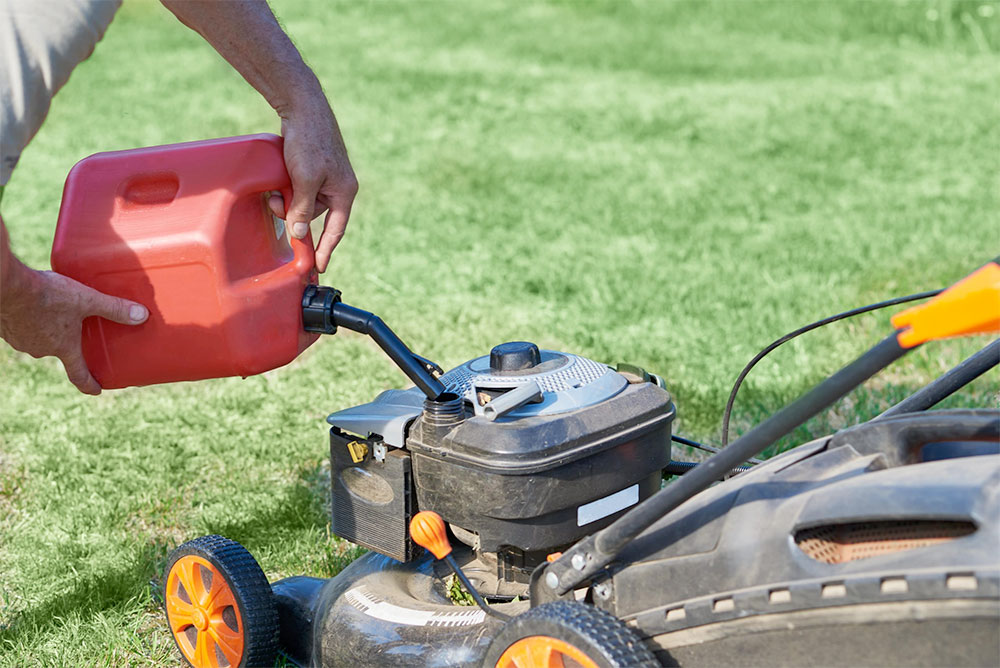With proper maintenance, mowers can endure for a decade or more; however, neglecting their requirements, such as opting for cheaper fuel, can accelerate wear and tear. Consulting the manual is recommended to guarantee the ideal fuel selection, although generally, gasoline with an octane rating of 87 or above is suitable.
Using fuels below an octane rating of 87 increases the risk of damaging your equipment and could potentially invalidate your mower’s warranty, resulting in costly out-of-pocket repairs. Despite the perception that premium gas rated 91 to 94 octane is optimal for mower maintenance, it typically offers no significant advantage.
Also Read: Defining Boundaries: An Essential Guide to Lawn Edging
Maximizing Lawn Mower Performance With High-octane Fuel
Lawnmower engines will benefit from opting for high-octane fuel as it safeguards them from any natural buildup, giving them a longer period of time and energy to perform. While high-octane gas may be more expensive, it also contains cleaner components that can benefit the fuel system. Fuels, designed with superior ingredients, boast even longer shelf lives, lasting up to two years or more if properly stored.
Optimising Lawn Mower Performance With Ethanol and High-octane Fuels
Simply using ethanol gasoline does not guarantee an instant power boost to the lawn mower. It requires tuning the engine to optimize the benefits of alcohol, which is why it’s a key component in many fuels. For example, the 260 GT Plus, which contains 13 percent alcohol, can deliver significant performance gains when properly utilized. Similarly, Green E15 contains 15 percent alcohol and has been associated with horsepower increases for lawn mower engines.
Despite the performance benefits, alcohol has its drawbacks; additionally, for those seeking high-octane non-ethanol options suitable for specialized engines, 260 GTX, a 98-octane unleaded fuel designed for high-compression, smaller-bore engines and recommended for forced induction applications.
Enhancing Lawn Mower Engine Performance with E87 Fuel
In pure gasoline, combustion relies solely on atmospheric oxygen, while ethanol in E87 contains approximately 34% oxygen by weight, enabling more efficient combustion and potentially boosting lawn mower engine power.
Additionally, E87’s higher heat absorption during phase transition contributes to enhanced performance and tolerance for increased compression and boost without detonation compared to standard unleaded fuels. However, the E87 demands a significantly larger fuel volume than gasoline, necessitating upgrades to the fuel system.
Moreover, E87 composition can vary based on seasonal regulations, with ethanol content ranging from 51% to 83%, potentially affecting engine tuning consistency. For consistent performance, fuels like E87 maintain a fixed ethanol ratio, eliminating the need for frequent adjustments.
The Power of Oxygen-rich Fuel

The oxygen-rich fuel gives a 17% increase in horsepower in lawn mowers compared to 93 octane pump gas. An oxygen-rich, unleaded, 105-octane race fuel containing 10 percent oxygen by weight stands in stark contrast to typical pump gas, which only has 3.7 percent oxygen by weight with its 10 percent ethanol content by volume.
A straightforward way to understand this is that gasoline exhibits high energy density when compared to other fuels. So, one tank of gasoline can propel you a greater distance than other fuels.
By considering energy density and air/fuel ratio collectively, you can gauge the amount of energy generated during combustion. Certain fuels yield more energy when burned with one gram of air, thereby offering higher power output from an engine. The components found in this oxygen-rich fuel enable it to release slightly more energy per unit of air burned compared to gasoline.
A Critical Consideration for Lawn Mower Maintenance
The small engines of the lawn mower demand specialized fuel, particularly emphasizing the need for moisture-free fuel.
Moisture penetrates fuel systems due to the attraction between atmospheric moisture and the alcohol content prevalent in modern fuels, such as the ethanol present in most gasoline blends.
Unlike modern automobiles equipped with closed fuel systems, lawn mowers typically rely on open systems facilitated by vented caps, allowing atmospheric air, along with moisture, to enter the fuel tank. This moisture can degrade engine performance, ranging from minor issues to complete failure to start.
Conclusion
To maintain optimal performance of a lawn mower, use good, rich fuel that is moisture-free and ensure your mower remains free from excessive dirt and debris, which can hinder blade rotation and its starting.






